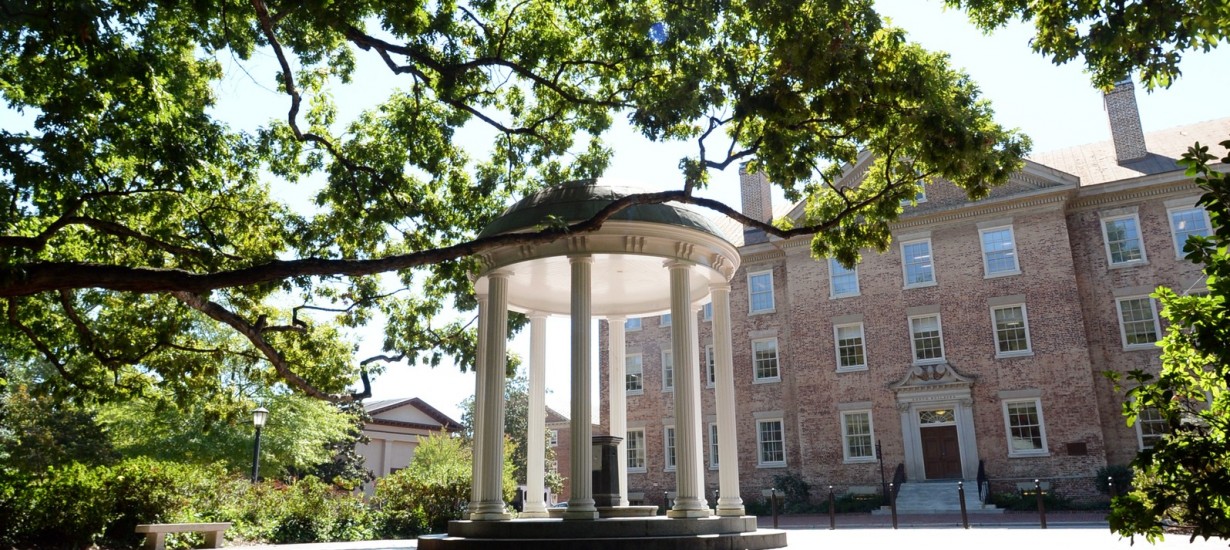SACS Restores UNC to Full Accreditation

The University is back in the good graces of its accreditation agency.
Chancellor Carol L. Folt announced Thursday that the Southern Association of Colleges and Schools has lifted UNC’s yearlong probationary status related to the academics-athletics fraud case that first came to light five years ago. The decision came in a meeting of the board of directors of SACS’ Commission on Colleges in Memphis, Tenn. Folt received a phone call, and the University should receive an official letter next week.
“Where we are today has taken deep introspection,” Folt said in a video message. “It’s taken admission that we needed to focus more in certain key areas. We’ve been working closely with our accreditation board to address the academic irregularities that ended in 2011.”
Folt said the work of reforming many of the University’s policies and practices has spanned five years and involved hundreds of people.
“We’ve demonstrated to SACSCOC that the reforms and initiatives we instituted are working and working well.”
When UNC was put on probation in June 2015, SACS President Belle Wheelan said it was the first time in her 10 years with the commission that SACS had put a school on probation for matters of academic integrity.
In November 2014, SACS notified the University that it was out of compliance with standards in 18 categories. In June 2015, the commission’s board of trustees said that it was satisfied with UNC’s progress in 11 of those areas but that the University had failed to meet SACS’ standards in seven remaining categories: integrity, program content, control of intercollegiate athletics, academic-support services, academic freedom, faculty role in governance and compliance with its program responsibilities under Title IV of the Higher Education Act.
Though details are not yet available, SACS clearly became satisfied that UNC had improved its adherence to those standards. The agency could have extended probation for a second year. A school still out of compliance after two years loses its accreditation, a prelude to losing federal funding.
SACS first investigated UNC in 2012, and early in 2013 it notified the University that it was out of compliance with principles of accreditation in the scandal involving academic fraud in the then-department of African and Afro-American studies. It advised UNC to “take immediate steps” to come into compliance with its standards on academic policies, academic support services and student records and with the federal definition of college credit hours.
The commission stopped short of placing UNC on probation that time. In June 2013, SACS announced it had decided not to sanction the University. It asked UNC to provide a monitoring report by the following June on continued progress with academic procedures in the department. UNC subsequently offered free makeup classes to about 80 students and more than 300 alumni who had enrolled in AFAM courses that were not taught as advertised.
The agency opened a second probe late in 2014, saying the information in the Wainstein report on academics and athletics irregularities released in October of that year raised questions about UNC’s compliance with its principles of accreditation. The commission also asserted that UNC may have withheld some of what it knew about the issues during its review in 2012-13. SACS said the University “was not diligent in providing information to the Committee” as it gathered more information about the scandal after its previous review.
UNC still has not reached a resolution of these same issues with the National Collegiate Athletic Association.
A year ago, the NCAA charged the University with lack of institutional control in its alleged failure to monitor the former AFAM department and its academic support center for athletes and asserted that UNC failed to rein in both when some employees began working together to perpetrate academic fraud over an 18-year period.
In a revision of that Notice of Allegations in April, the NCAA steered away from charges of special benefits to athletes, instead concentrating on failure to monitor the Academic Support Program for Student-Athletes and the then-AFAM department. It also indicated that the staff of the ASPSA had not known they were doing anything improper.
UNC had 90 days from April 25 to respond to the NOA, and Folt said Thursday that work was continuing on that.
